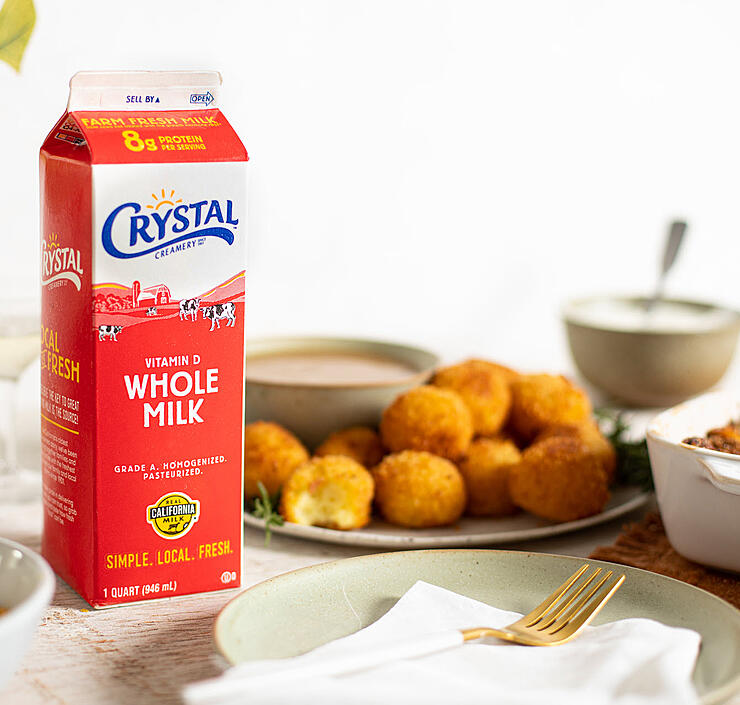
Milk: Liquid Gold
We mortals certainly enjoy it, but elite athletes have come to depend on milk’s standout superpowers to keep healthy and strong. What is it about milk that makes it such a high performance drink?
After a long day of play or practice, mom probably put out a plate of cookies or a PB&J with a large, cold glass of milk. And while we inhaled that goodness with an exhausted smile on our faces, what we didn’t know as kids was how much nutritional good that milk was doing for our recuperating bodies. (Thanks mom!)
Now amplify that afterschool practice x 1000 and you’ve reached elite level training. And guess what? You’re still likely to find a glass of milk on the table after practice. (Thanks coach!)
Fueling Athletes for Centuries
Over 11,500 athletes competing across 33 sports from all over the world are coming together to compete on the highest stage this summer. That’s a lot of combined energy spent on courts, fields, and tracks over the years. These top athletes prepared their whole lives to be at peak performance when that buzzer sounds — and nutrition has been a fundamental tool in their preparation.
Long before multi-colored sports drinks arrived on scene, athletes relied on the most nutritionally dense beverage available for fuel, recovery and hydration: milk. Today, despite what the drink makers claim about their “precision blends” and “unique formulations,” many athletes still prefer to reach for all-natural milk.
For example, the 4 athletes of Team Milk — Maurio McCoy (skateboarding), Cat Osterman (softball), Ariel Torres (karate), and Hannah Roberts (BMX freestyle) — all call milk their go-to. But why milk and not a lab formulated sports drink?
“When you’re drinking milk, you know the benefits it’s giving you,” says Osterman. The unique advantages of milk over formulated sports drinks lie in milk’s natural make-up: water, carbs, minerals, fat and protein.

Milk delivers a nutrient package that athletes of all ages need. From after-school athletes to elite elites, restoring the minerals and salts lost during a tough practice is essential.
In addition to the high-quality protein, milk provides:
- Vitamin A, zinc and selenium to support a healthy immune system.
- Four B vitamins — riboflavin (B2), niacin (B3), pantothenic acid (B5), and vitamin B12 — to help convert food into energy.
- Calcium, vitamin D, phosphorus, and protein to build and maintain strong bones and reduce the risk for stress fractures.
- Iodine to help regulate metabolism.
- Potassium* to help maintain normal muscle function and regulate the balance of fluids in the body.
Supporting Teams at Every Stage
The career of every worldwide phenom begins at home. That’s why Crystal Creamery has supported local athletic teams for nearly a decade.
In partnership with the California Interscholastic Federation (CIF), Crystal Creamery currently sponsors the Sac-Joaquin, Central, and North Coast Sections of the Federation. All combined, our sponsorship reaches more than 470 high schools, their student-athletes, and their families.
“Crystal Creamery is thrilled to be able to support local high school athletes who give their best to our communities year in and year out,” says Brian Carden, Senior Director of Sales at Crystal Creamery. Learn more about our community promise here.
Bonus Points
Research like this, published in the International Journal of Sport Nutrition and Exercise Metabolism, shows that milk may help you stay more hydrated after exercise than sports drinks or even water. (It’s the protein in milk that gives the body something to digest. With that, the body then has time to absorb the water naturally found in milk rather than it just passing through quickly the way plain water or carb-based drinks do.)
So let’s all get out there and play, whether we’re reaching for the gold or just working through one more practice before dinner.
*Based on the 2019 DRI for potassium developed by NASEM.




